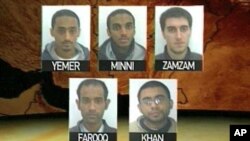The recent arrest of five American men in Pakistan on suspicion of trying to join militant Islamist groups has triggered concern in Washington about whether the United States has become complacent about homegrown terrorism. The five from Virginia were arrested in Pakistan allegedly for attempting to engage in Jihad against the U.S. troops in Afghanistan.
Two alleged members of the Pakistan-based terrorist group Lashkar-e-Taiba, David Headley and Tahawwur Hussain Rana are being tried in Chicago on charges of links to last year's terror attacks in Mumbai, India.
Najibullah Zazi was just a friendly hotdog stand vendor to those who knew him, not as it is alleged, an al-Qaida operative conspiring to set off bombs around New York.
Not many people knew Major Nidal Hasan, the U.S. Army psychiatrist accused of killing 13 and wounding more than 40 in a shooting rampage at a military base in Texas. The U.S. Congress is concerned.
"The threat is real, and we are still at risk in this nation. Case after case demonstrates this fact," said Representative Brian McCaul of Texas.
Macall is a ranking Republican member of a House committee that held a hearing this week on homegrown terror.
The committee heard testimony about how to deal with homegrown terrorists while still protecting freedom of speech.
The question some analysts are asking, has the U.S. become complacent?
"I think that we have become very complacent," said terrorism analyst Miriam Mendelson. "We are tending to look at larger and more spectacular attacks to focus on and we are not looking at the day the radicals wake up and say, 'Wow. We can do something small and it can have a huge affect,' we are in trouble."
But counterterrorism expert Matthew Levitt of the Washington Institute for Near East Policy says the U.S. is not complacent.
"Neither in countering-terrorism - they are quite proactive, and nor in trying to defeat the radical narrative that promotes this clash of civilizations, which is ridiculous. There is more we can do and there are things we can do better," he said.
James Zogby of the Arab American Institute says the problem needs to be handled delicately. He says a large number of Muslims and Arab Americans reject the idea of an alleged clash of civilizations being promoted by terrorist groups on the Internet.
"They have worked within the political process available to them," he said. "They have fought discrimination, they have combated hate crimes and they have voiced their differences in the U.S. as citizens and not as aliens."
But he says some alienated youth from these communities have become susceptible to anti-social radicalization. But he says this is not new.
"We have seen it before. In the past four decades that I have been involved in politics, we have witnessed recruitment into white supremacist and Christian nation and militia organizations, the Black Panthers, the Jewish Defense League, the IRA, and the Tamil Tigers," he added.
The consensus among analysts is that more can be done not on the government level, but on the local level, by involving community leaders and parents of the young Muslims who are vulnerable to the messages sent daily by the recruiters on the Internet.
News
Experts Concerned US Homegrown Terrorism On the Rise
update

Some U.S. lawmakers and terrorism experts say although American ideals about civil liberties can be a hurdle in preventing radicalization of Americans, they are optimistic that homegrown terrorism can be tackled on the community level.




